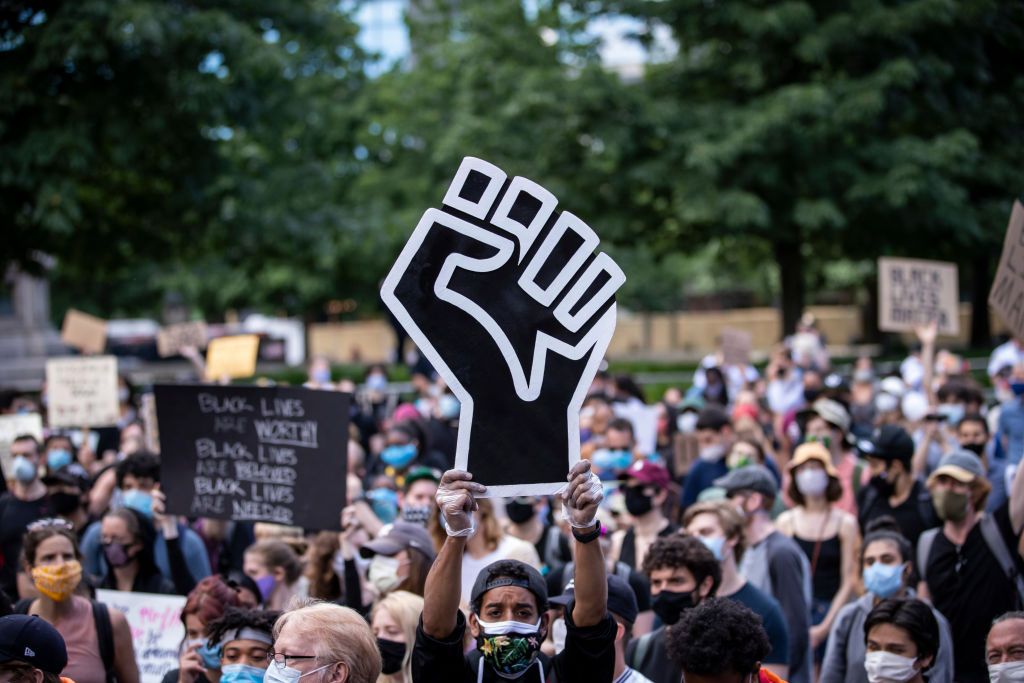One Year Later: We’re Not Okay, But We’re Going To Be All Right

Source: askmenow / Getty
Today marks one year since the World Health Organization declared COVID-19 was, as feared, a pandemic.
I remember picking up my oldest daughter from preschool the week before, and then never returning. Her teachers came and delivered her naptime sheet and spare set of clothes weeks later. I remember the teachers sending videos of them sitting in the empty classrooms reading books and singing songs in order to retain a connection with their students and continue their education from afar. That June, during her virtual graduation ceremony, we cheered from the couch as her teachers deemed her “Most Likely To Be The First Woman President.”

Source: FG Trade / Getty
It still causes a physiological response to recall just how confused and afraid we all were in the days and weeks and months that followed WHO’s announcement, and how our wildest fears could not have prepared us for the year to come. In the midst of the pandemic — which was disproportionately killing Black and brown Americans — news of the murders of Ahmaud Arbery, George Floyd and Breonna Taylor (along with too many others) ignited a global protest movement that engulfed the news media. The streets were filled with Black people who had reached their limits from L.A. to Berlin to Rio de Janeiro. The Manhattan Bridge nearly resembled the Edmund Pettus Bridge during 1963’s Bloody Sunday as the NYPD surrounded protestors this summer. Scenes like this took place all over the country.

Medical workers hold signs during a rally organized by a group named White Coats for Black Lives in New York City following the death of George Floyd on 25 May 2020. | Source: Maria Khrenova / Getty
It’s safe to say that nothing will be the same — which is a good thing. In an article I wrote about the outsized impact of coronavirus on the most diverse zip code in my city, I spoke about how the pandemic uncovered the vicious web of inequities that resulted in excessive deaths in the area. Sonya Reid, a former public health program manager with the Wake County Human Services in North Carolina, pointed to how wage and education gaps, housing insecurity and the inaccessibility of healthcare and transportation in Raleigh’s poorest zip codes had already had a significant impact on resident’s health. While the county’s overall average life expectancy is 80, in the Southeast area (which is one of the poorest and most racially diverse) that number decreases to 75. These types of disparities existed across the country, to the point where public health workers like Reid were not surprised by the unequal impact of COVID-19 — and were so insistent about the data being made public.

Dr. Marcella Nunez-Smith, chair of President Joe Biden’s COVID-19 equity task force, speaks at an event in Wilmington, Delaware on Dec. 8, 2020. | Source: JIM WATSON / Getty
Between the pandemic, the high-profile murders of Black people and the state-sanctioned violence against protesters that followed, we have been through hell. But how have we emerged on the other side?
Emboldened
Thanks to the work of Black and brown organizers like LaTosha Brown, Stacey Abrams, Nsé Ufot and so many others, we turned out to vote in November (and January) in record-breaking numbers. We diverted money from police budgets to be reinvested into our communities. We imagined and birthed new ways to care for each other collectively. We nurtured intergenerational bonds and re-engaged our history — uncovering the stories white supremacy dared to hide and used them to guide our new movements. We created provocative and compelling art and built our own platforms to share it. We engaged in challenging conversations and forced those in power to answer for the harm they have caused and allowed to be caused, damning fragility’s cries of “cancel culture.” We stopped saying “I’m not my ancestors” and started saying “I am my ancestors’ wildest dreams.” And, finally, we proved that nothing and no one can stop us from realizing our liberation.

Women fill out vote-by-mail ballots at the Orange County Supervisor of Elections office on October 15, 2020, in Orlando, Florida. | Source: NurPhoto / Getty
We as Black people aren’t okay. The trauma of the pandemic, of the televised murders of our people, of the images of police beating us in the streets, of an intense election and terrifying Insurrection, will take us years to heal from. The deaths of friends, colleagues, mentors, icons and loved ones break my heart anew every time I think about it. The economic destruction will be felt by generations.

Legendary actress Carol Sutton is pictured May 1, 2019, in Los Angeles. Her cause of death on Dec. 10, 2020, was reported as COVID-19. | Source: Rodin Eckenroth / Getty
We aren’t okay. But, looking back on how far we have come despite the cruelest of odds, I can confidently declare that — together — we’re going to be alright.
SEE ALSO:
Beyond Mistrust: The Digital Divide Is Preventing Older Black People From Getting Vaccinated, Too
Racial Disparities In Vaccine Distribution Demand Equity In Priorities
[ione_media_gallery id=”3917798″ overlay=”true”]

